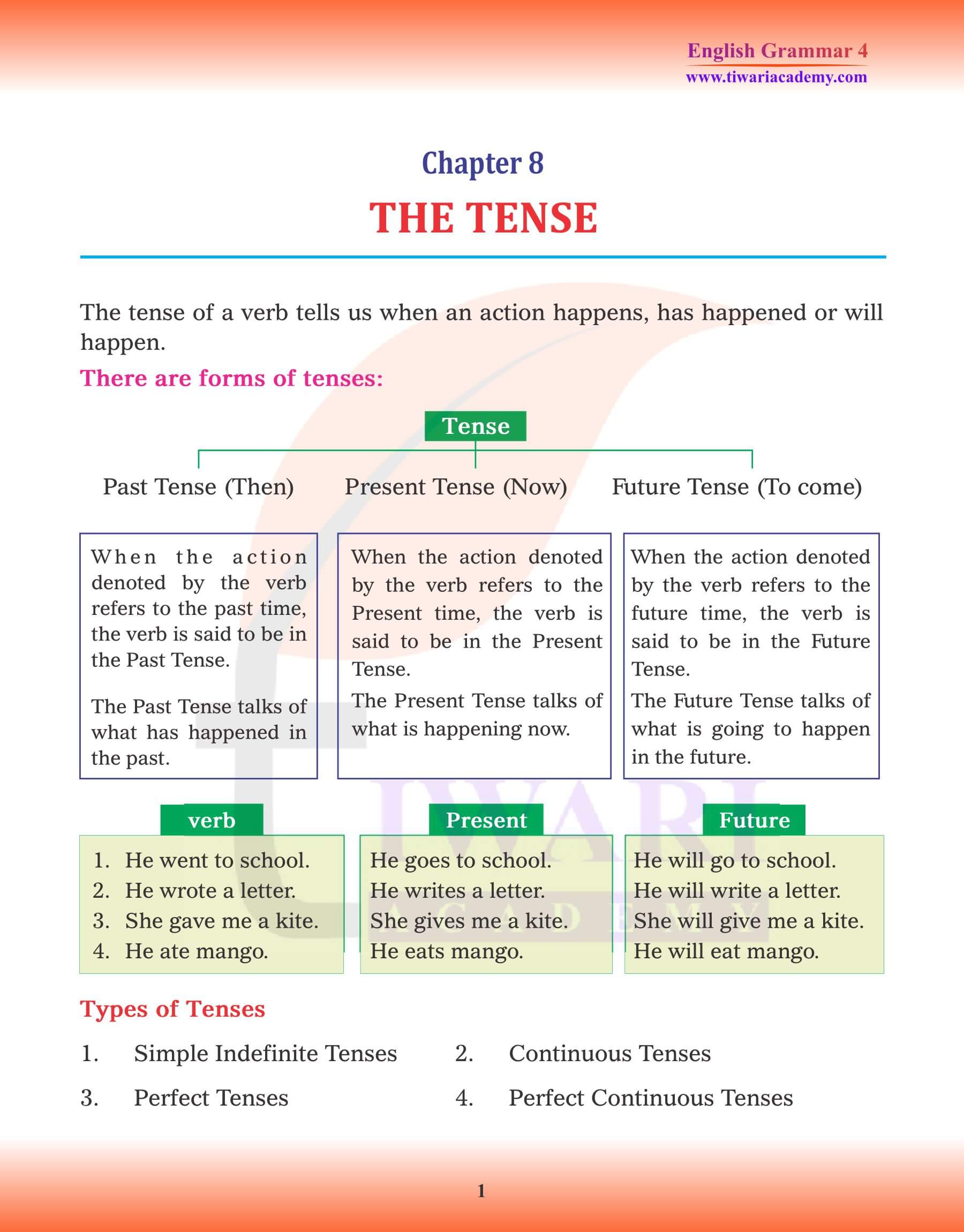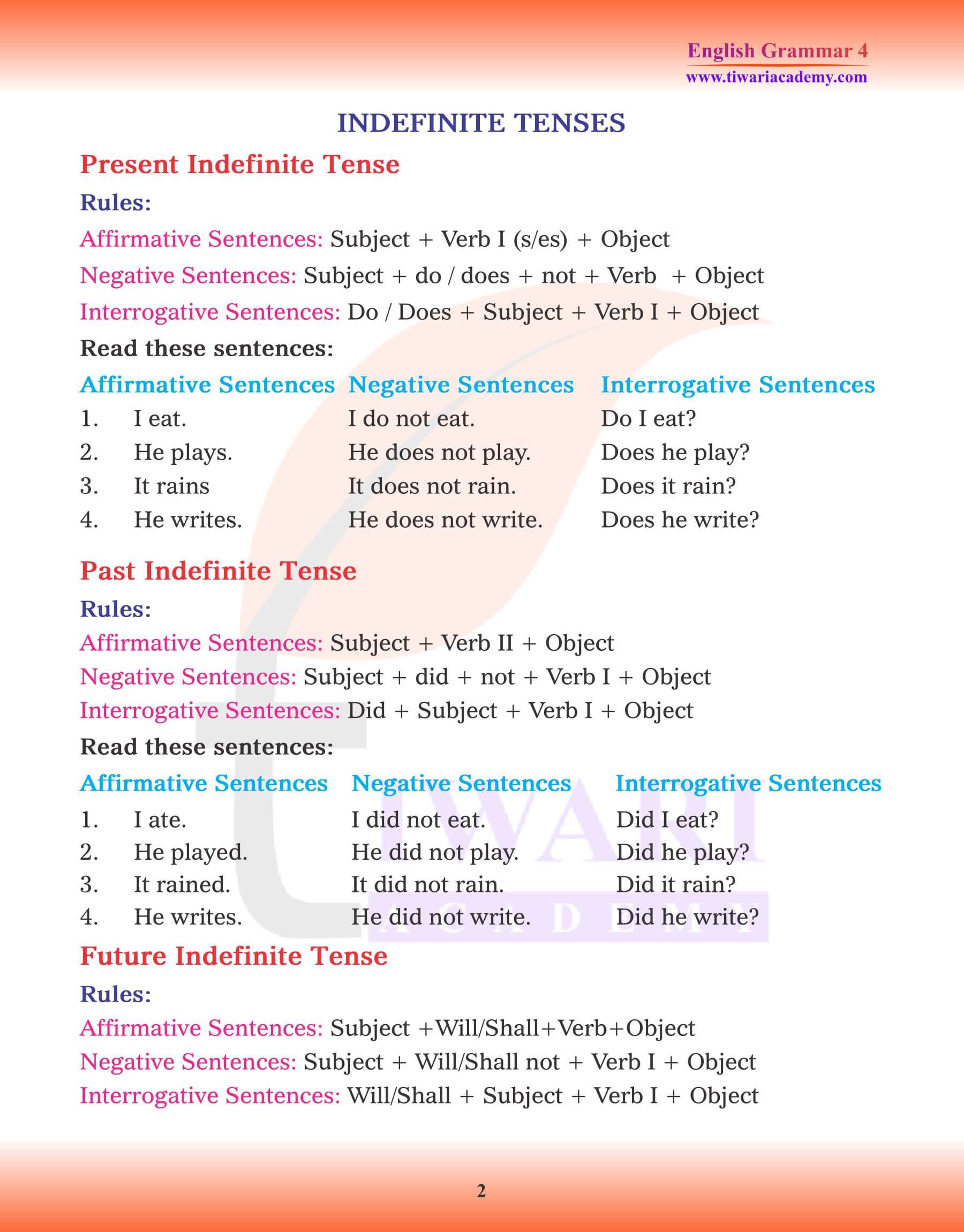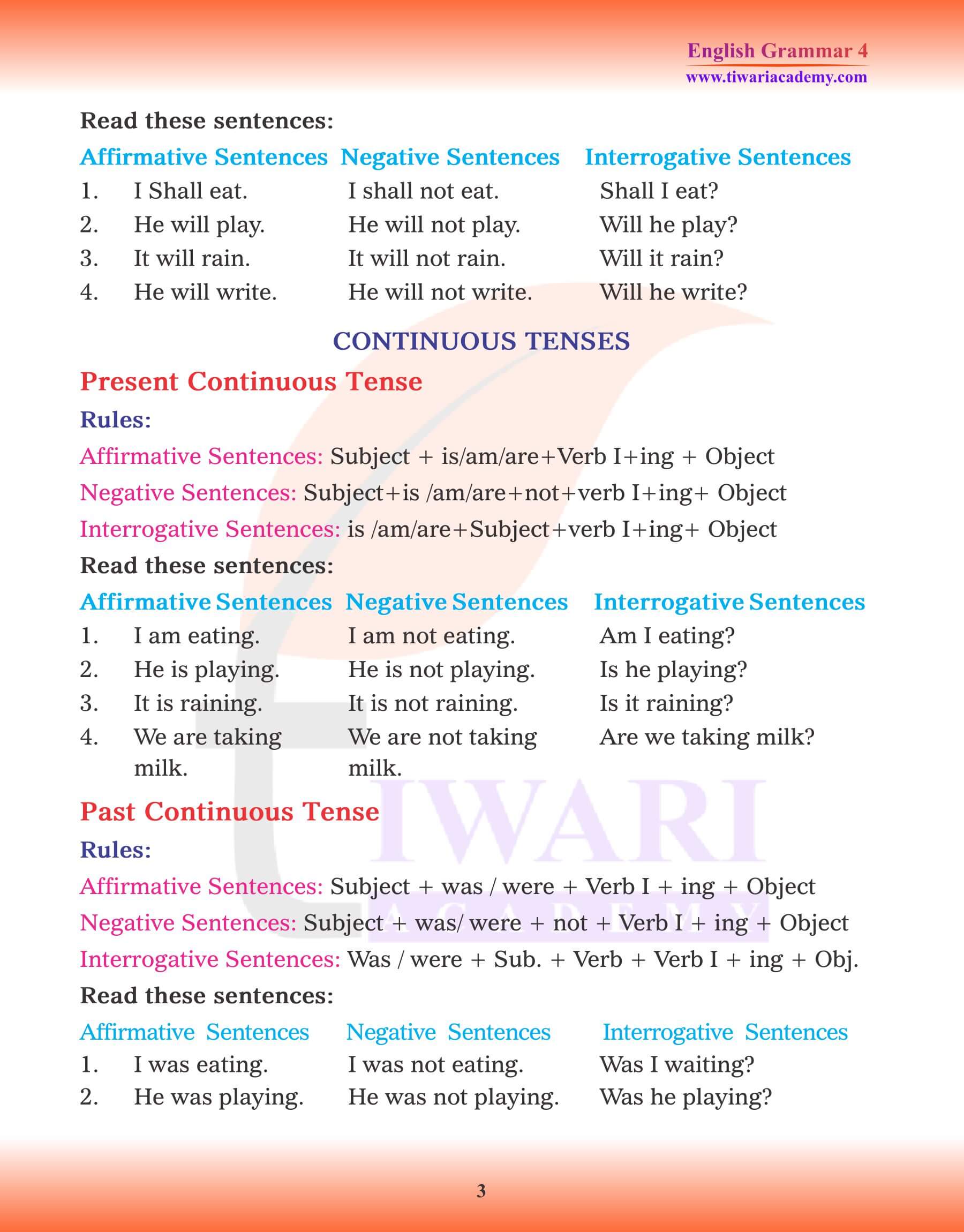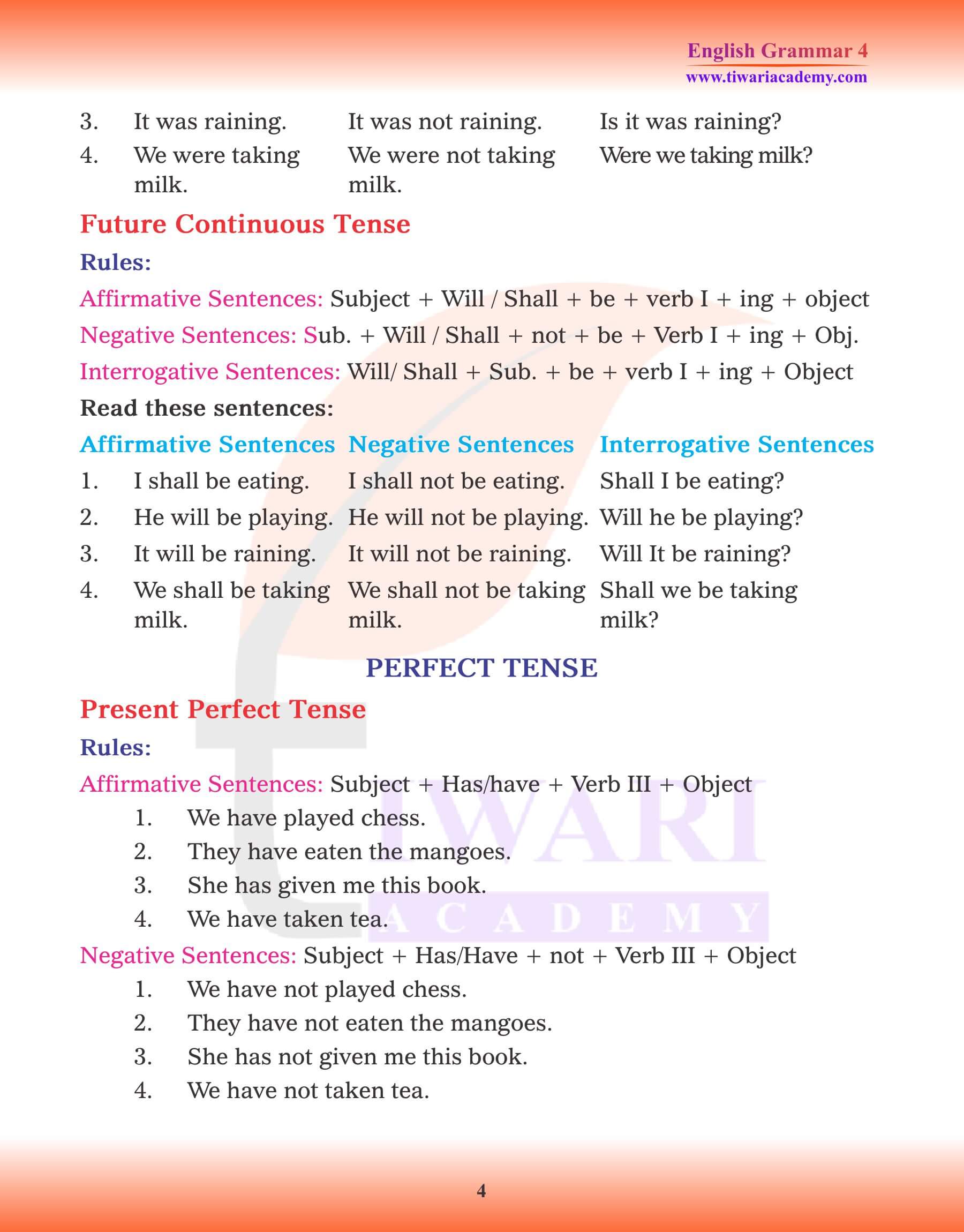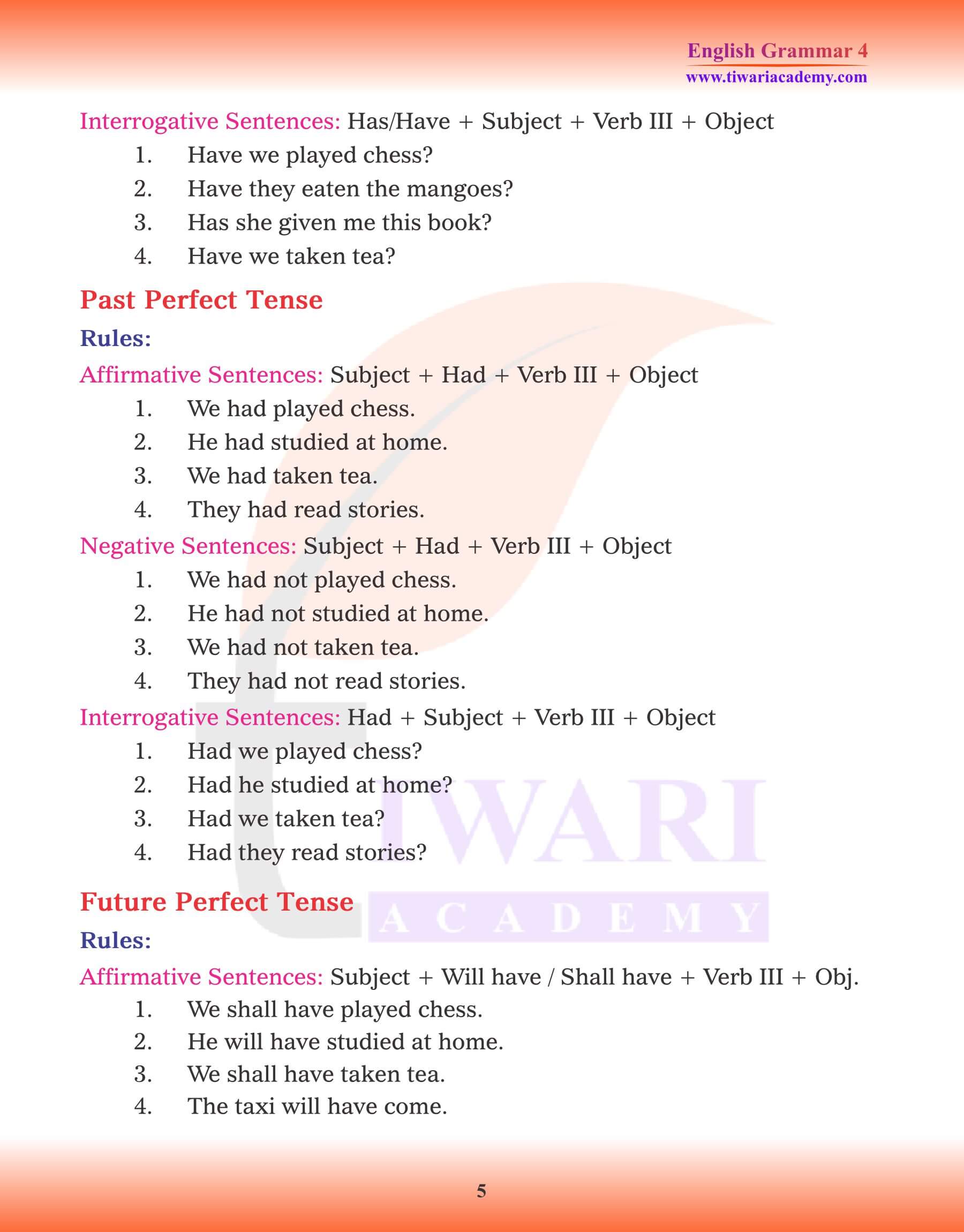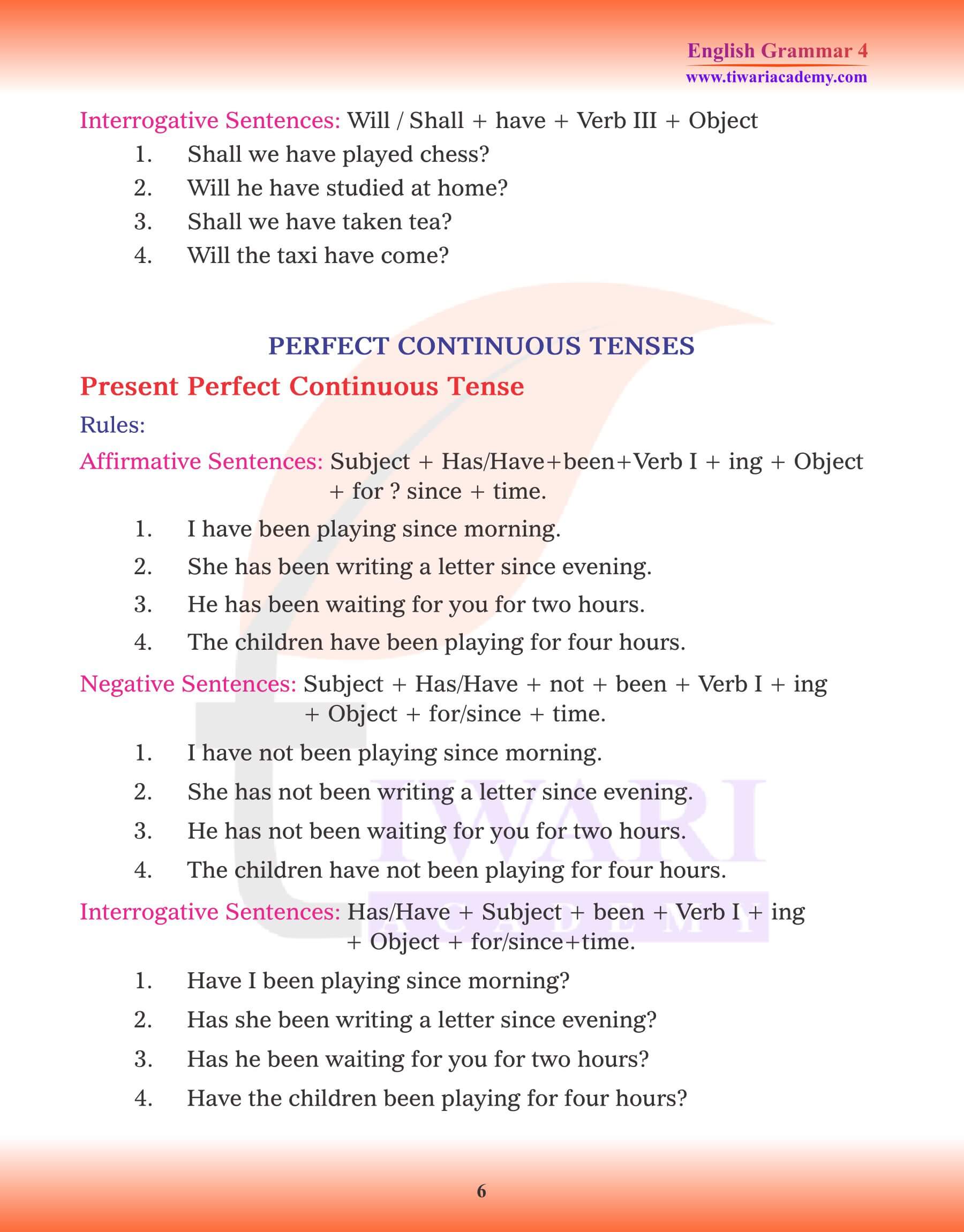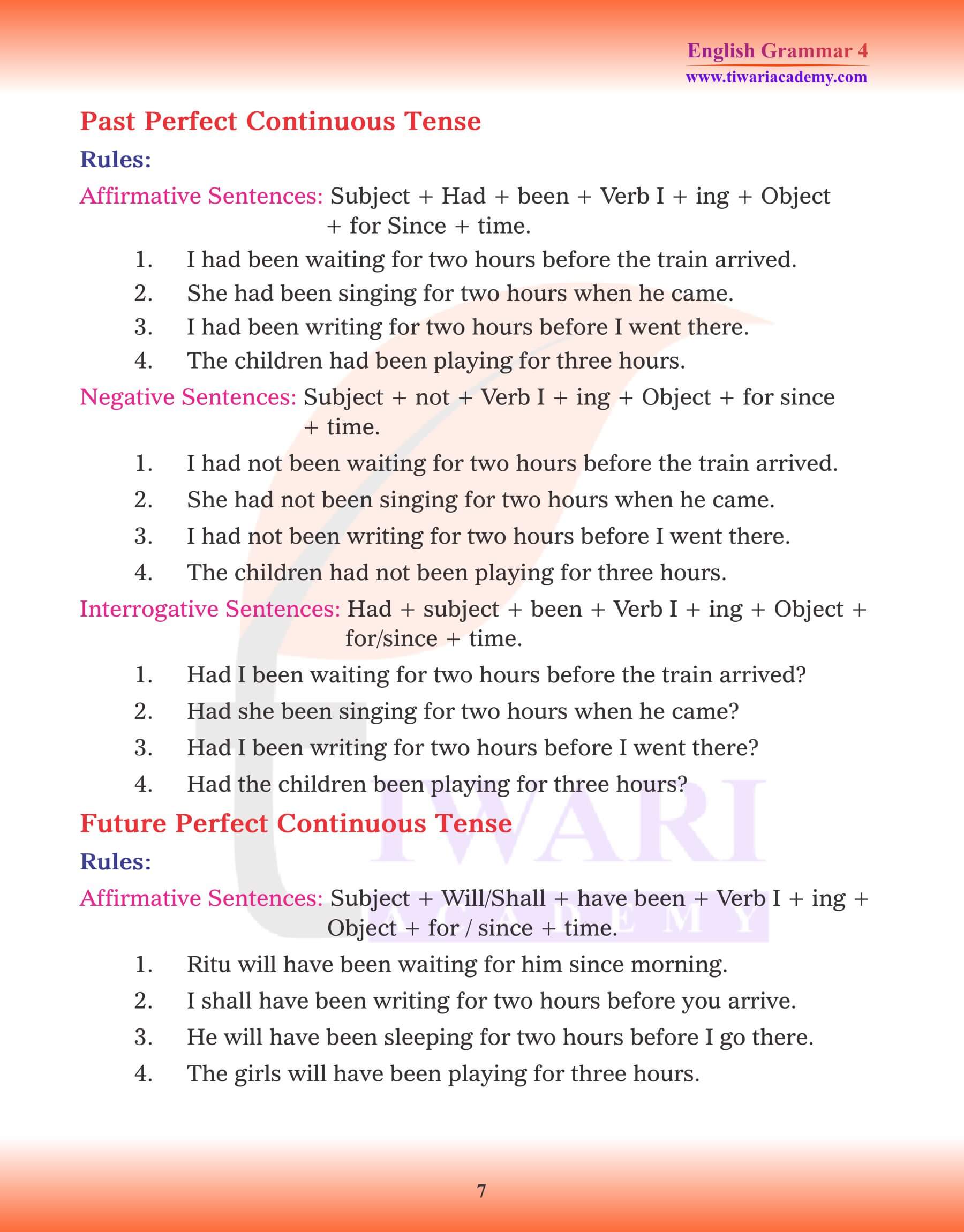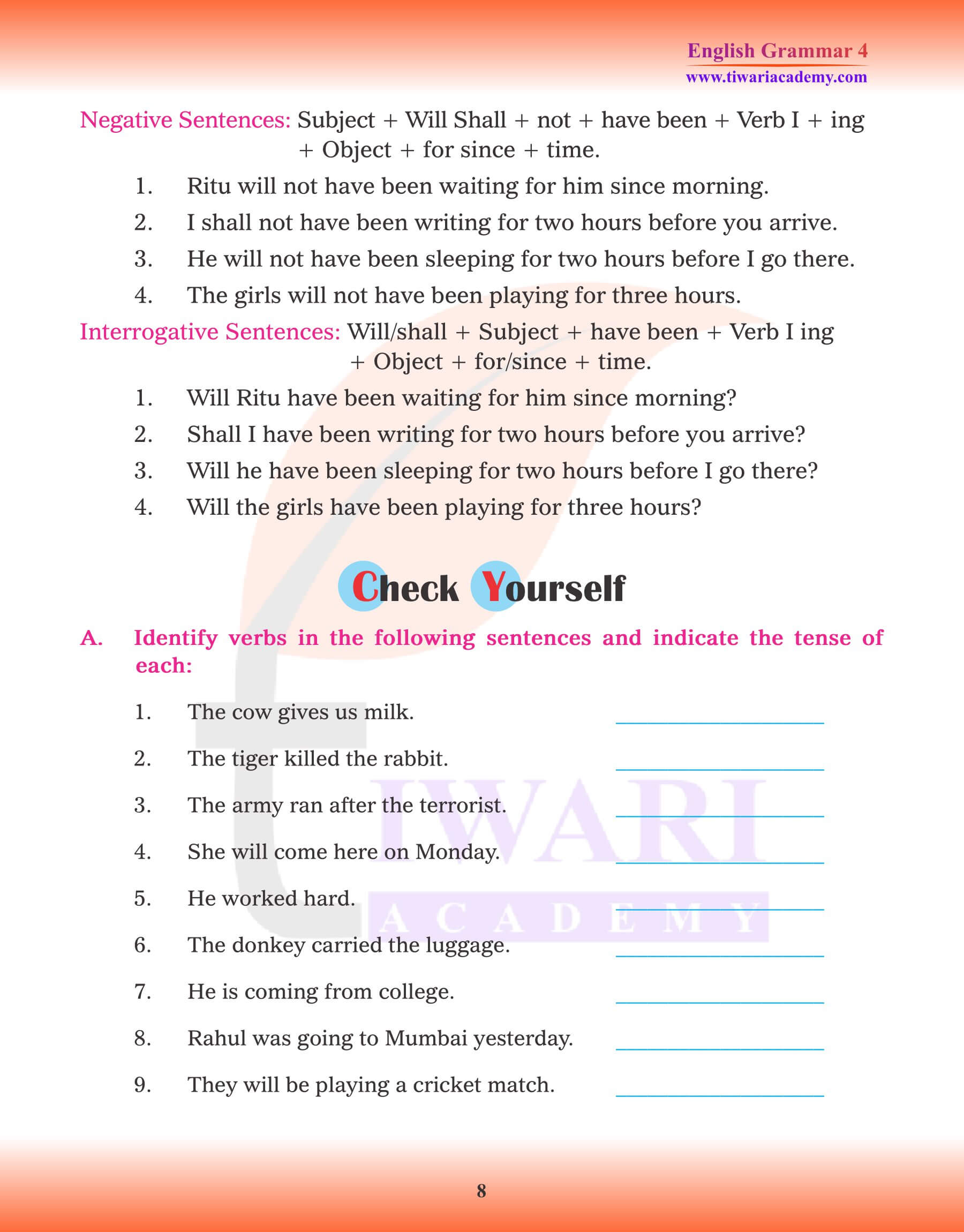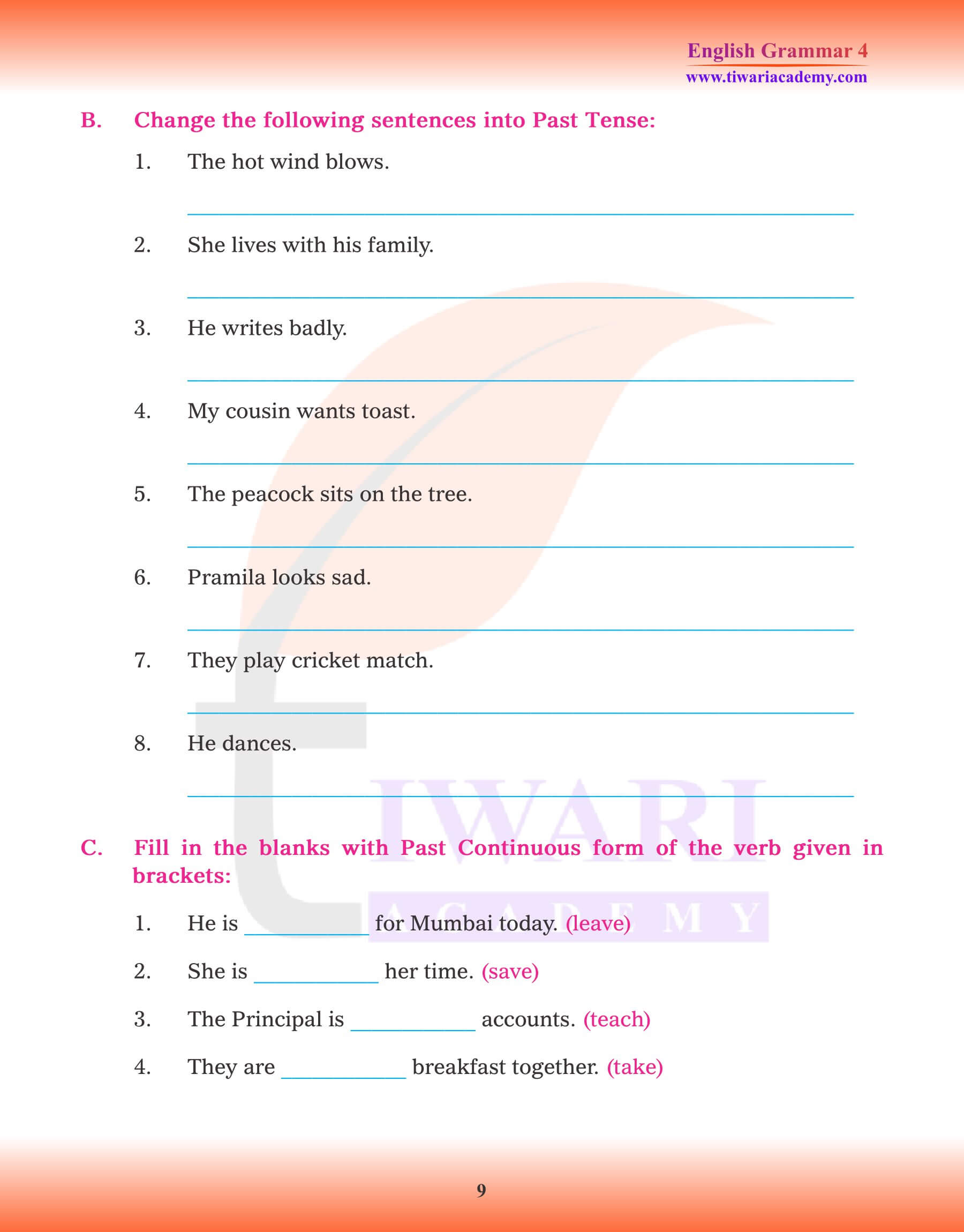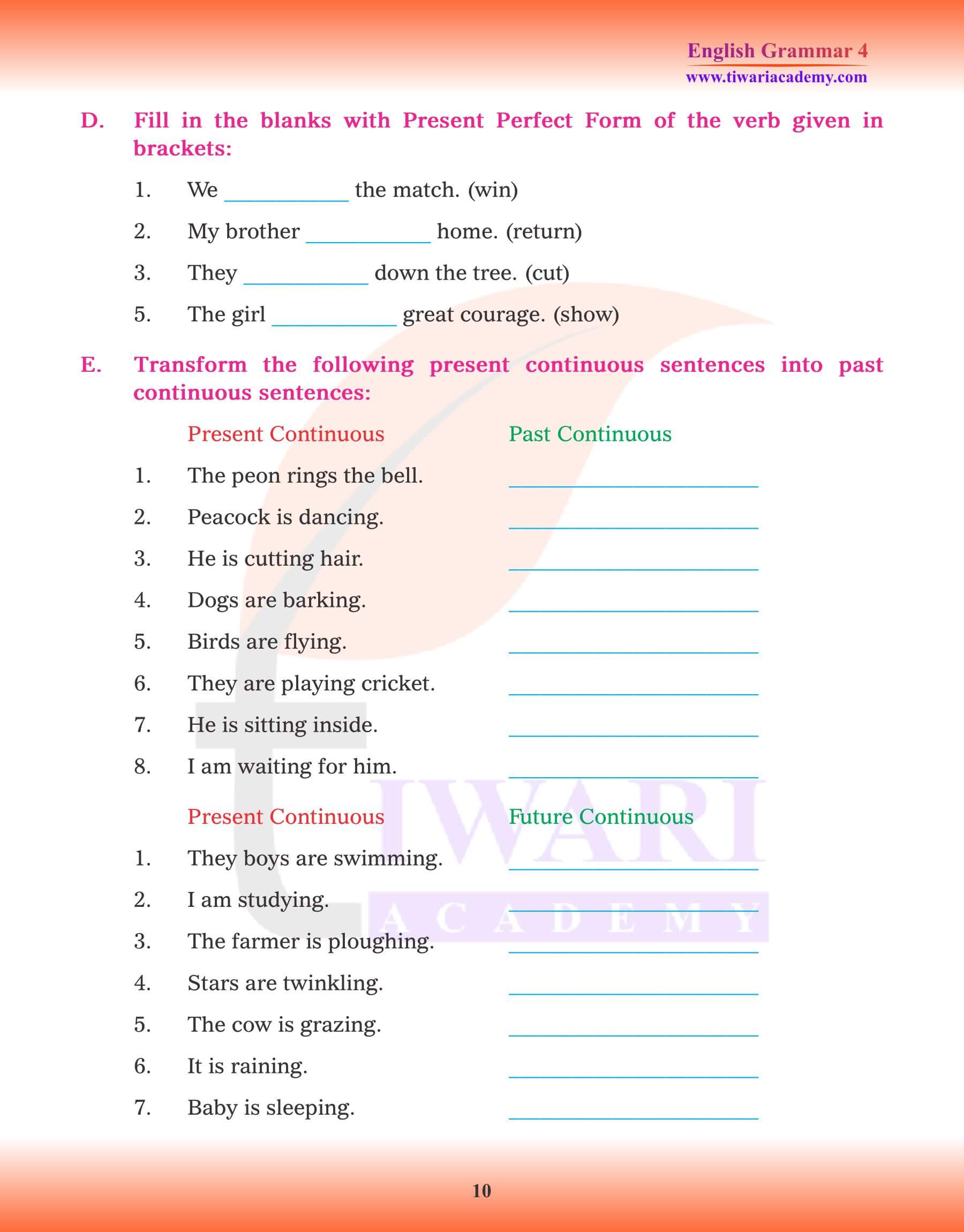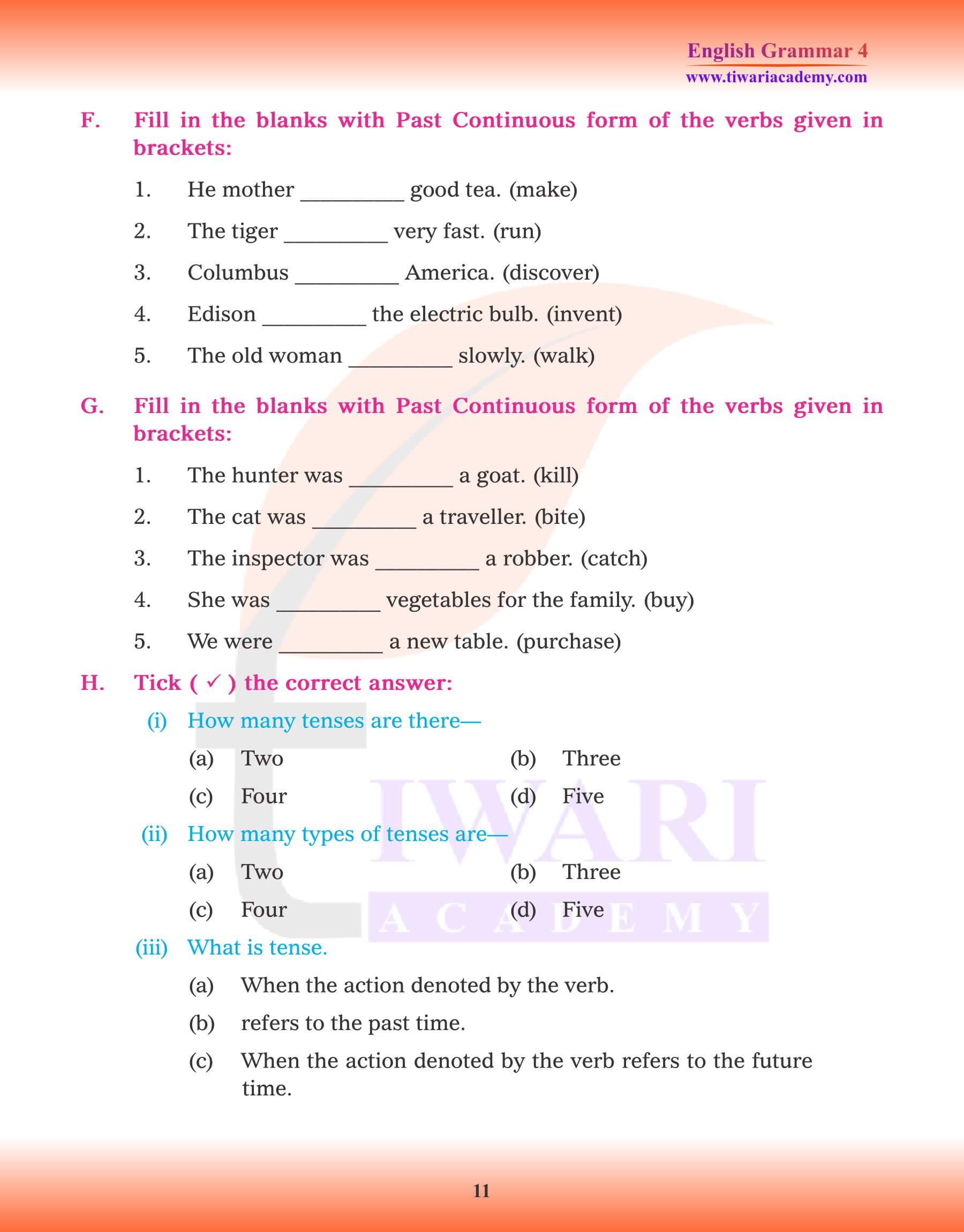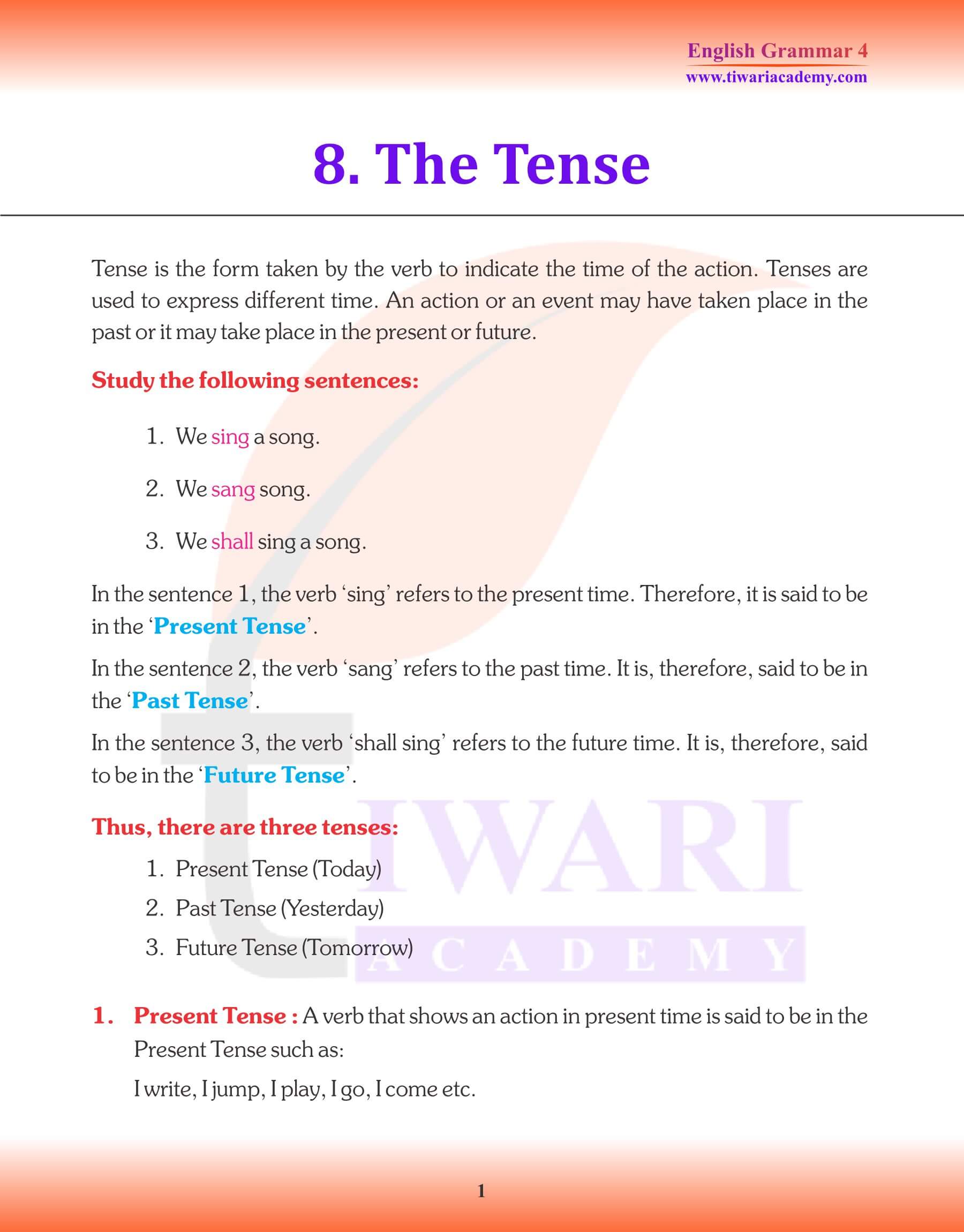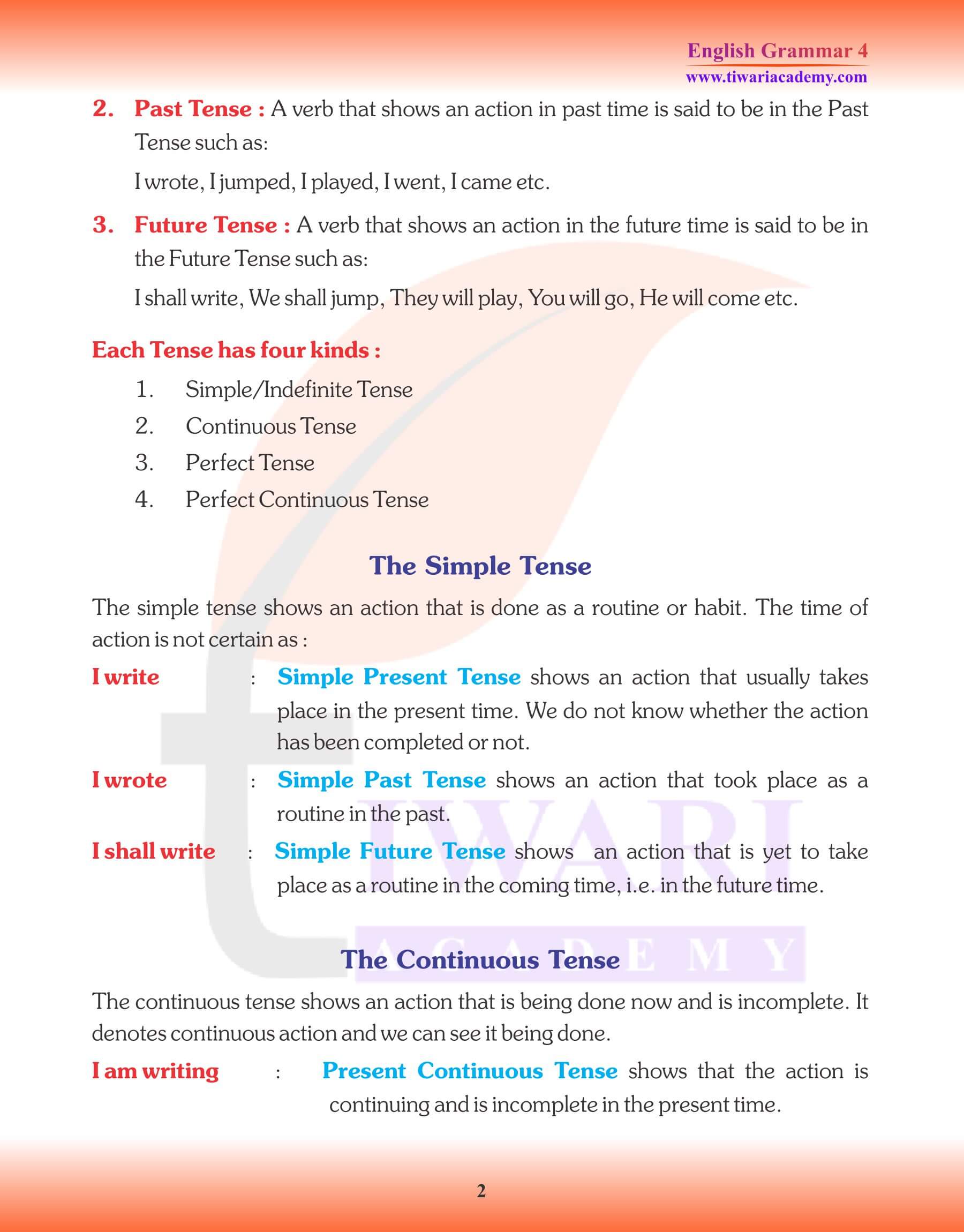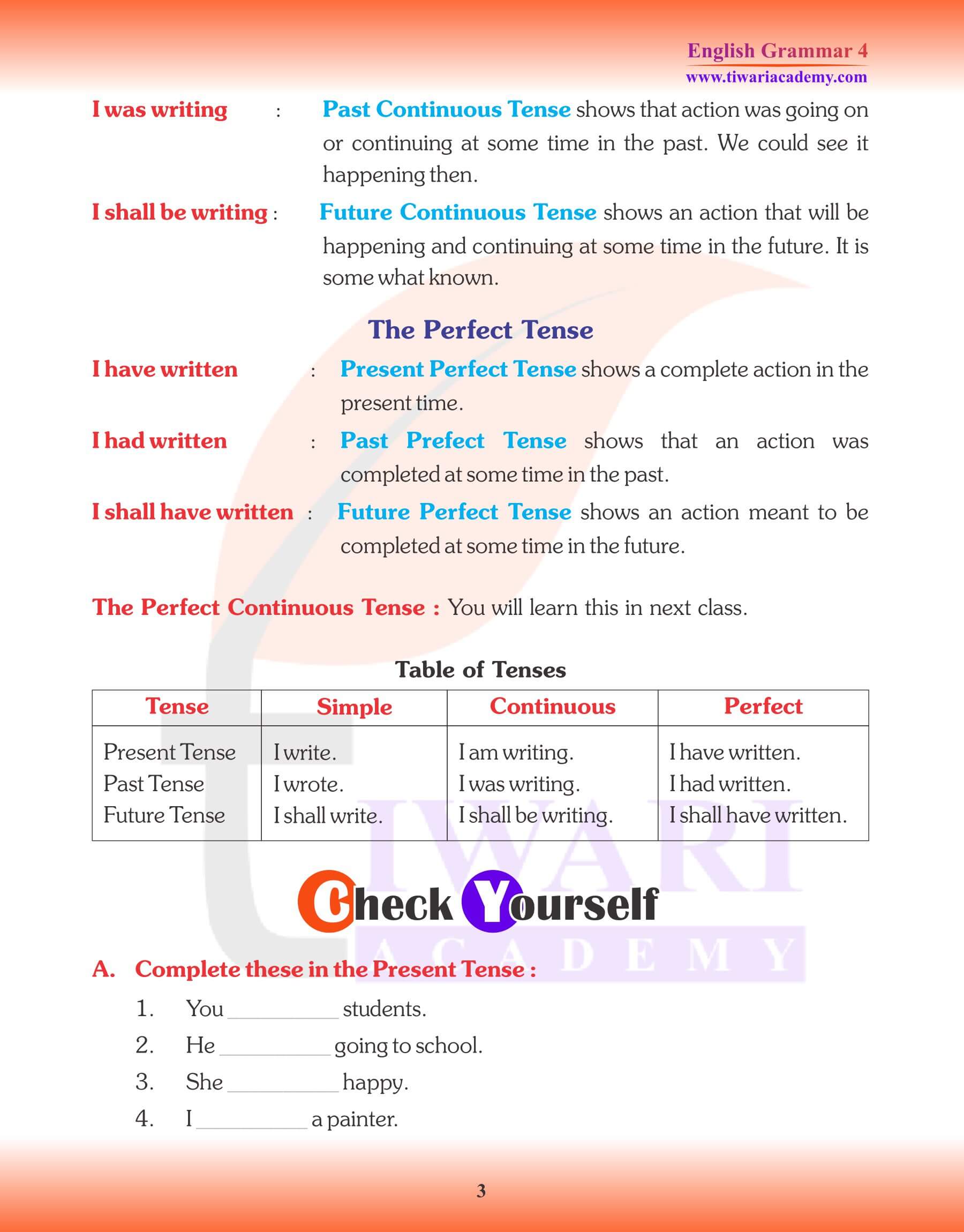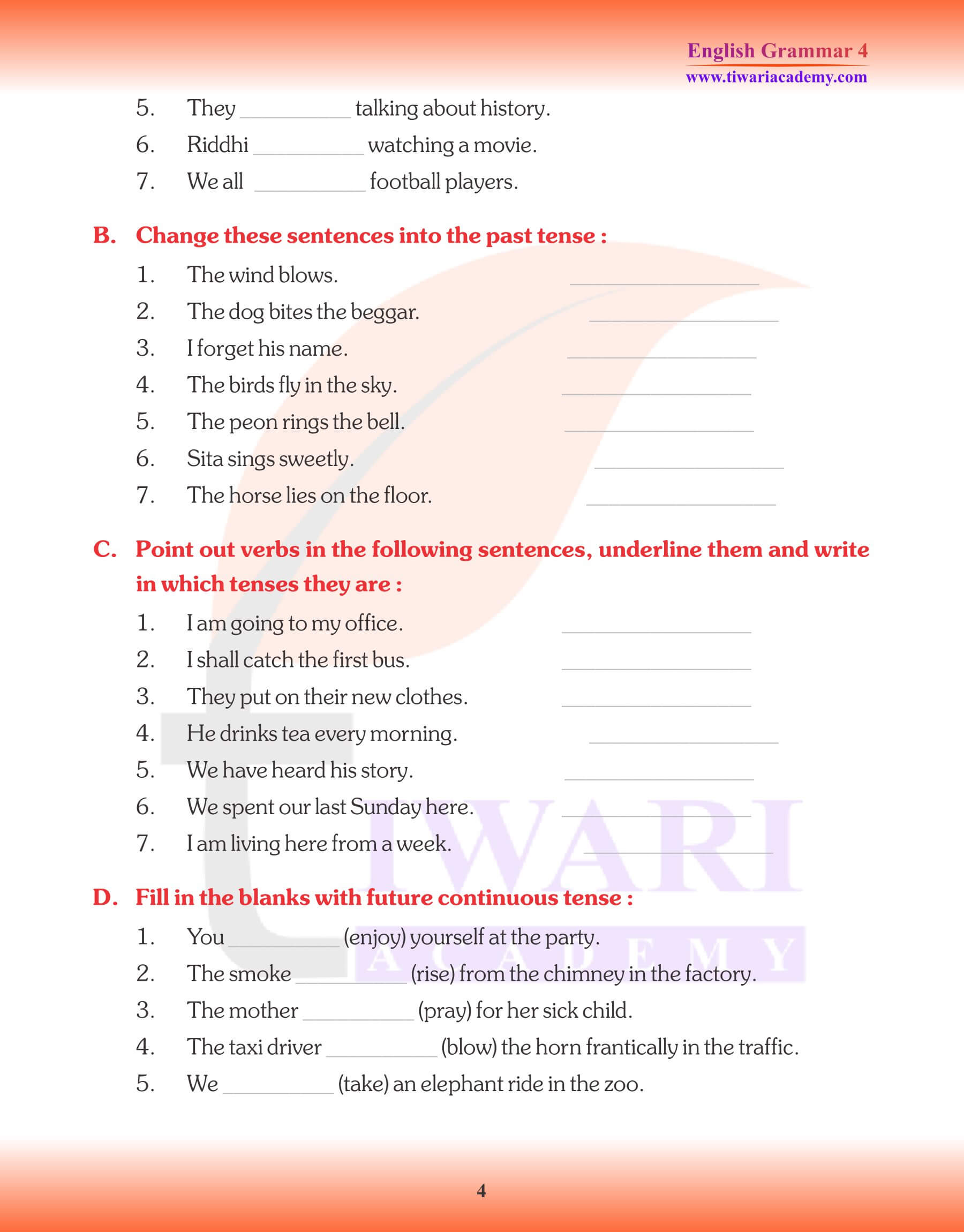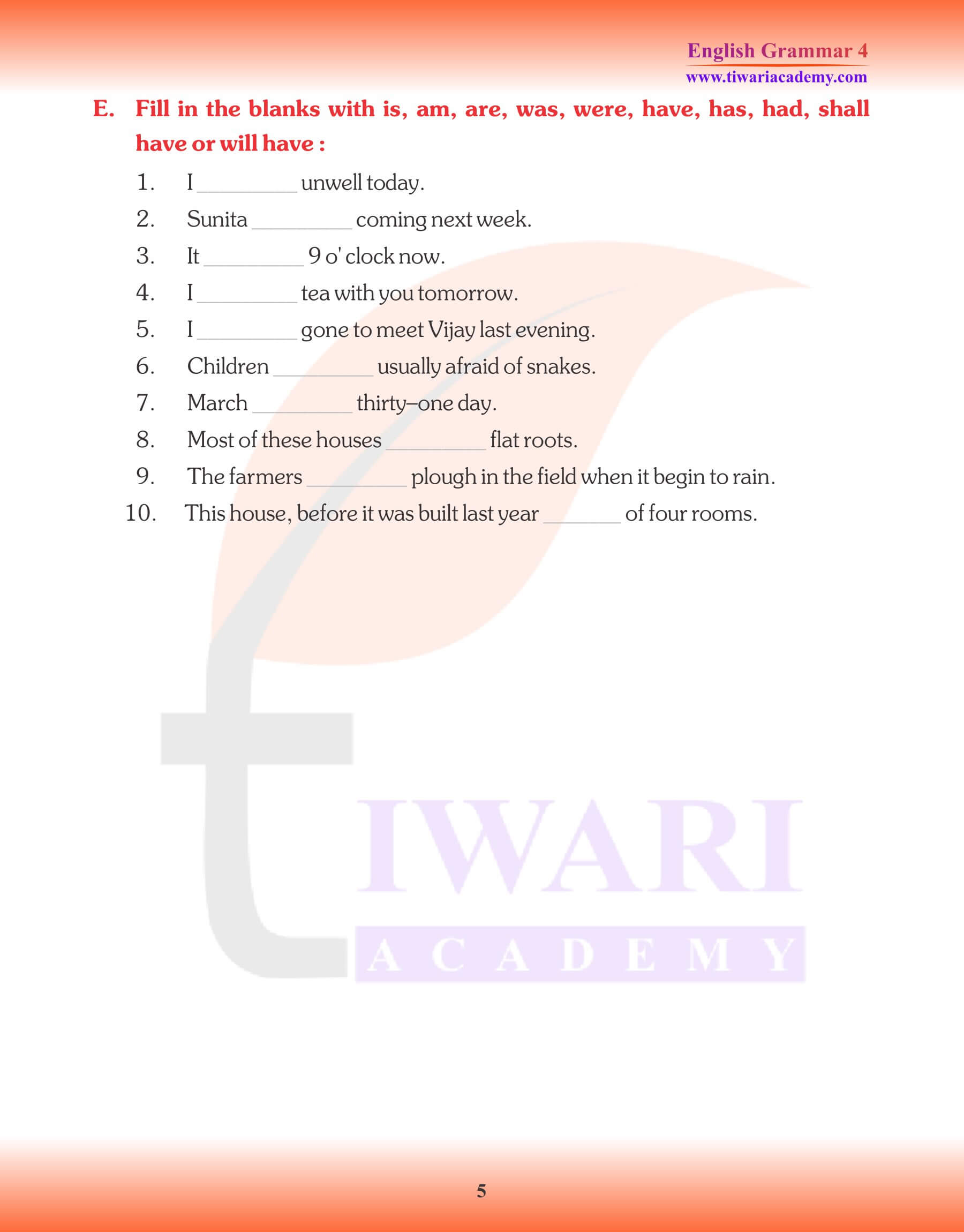NCERT Solutions for Class 4 English Grammar Chapter 8 the Tense updated for academic session 2025-26 for all boards free to use without any login. The tense of a verb tells us when an action happens, has happened, or will happen. Here, we will discuss about present, past and future tenses with lots of examples.
CBSE NCERT Class 4 English Grammar Chapter 8 the Tense
Class 4 English Grammar Chapter 8 The Tense
| Class: 4 | English Grammar |
| Chapter: 8 | The Tense |
Present, Past and Future Tenses
- Present Tense: When the action denoted by the verb refers to the Present time, the verb is said to be in the Present Tense. The Present Tense talks of what is happening now.
- Past Tense: When the action denoted by the verb refers to the past time, the verb is said to be in the Past Tense. The Past Tense talks of what has happened in the past.
- Future Tense: When the action denoted by the verb refers to the future time, the verb is said to be in the Future Tense. The Future Tense talks of what is going to happen in the future.
Types of Tenses
1. Simple Indefinite Tenses
2. Continuous Tenses
3. Perfect Tenses
4. Perfect Continuous Tenses
INDEFINITE TENSES
Present Indefinite Tense
Rules:
Affirmative Sentences: Subject + Verb I (s/es) + Object
Negative Sentences: Subject + do / does + not + Verb + Object
Interrogative Sentences: Do / Does + Subject + Verb I + Object
| Affirmative | Negative | Interrogative |
|---|---|---|
| I eat. | I do not eat. | Do I eat? |
| He plays. | He does not play. | Does he play? |
| It rains. | It does not rain. | Does it rain? |
| He writes. | He does not write. | Does he write? |
Past Indefinite Tense
Rule:
Affirmative Sentences: Subject + Verb II + Object
Negative Sentences: Subject + did + not + Verb I + Object
Interrogative Sentences: Did + Subject + Verb I + Object
| Affirmative | Negative | Interrogative |
|---|---|---|
| I ate. | I did not eat. | Did I eat? |
| He played. | He did not play. | Did he play? |
| It rained. | It did not rain. | Did it rain? |
| He writes. | He did not write. | Did he write? |
Future Indefinite Tense
Rules:
Affirmative Sentences: Subject + Will/Shall + Verb + Object
Negative Sentences: Subject + Will/Shall not + Verb I + Object
Interrogative Sentences: Will/Shall + Subject + Verb I + Object
| Affirmative | Negative | Interrogative |
|---|---|---|
| I Shall eat. | I shall not eat. | Shall I eat? |
| He will play. | He will not play. | Will he play? |
| It will rain. | It will not rain. | Will it rain? |
| He will write. | He will not write. | Will he write? |
CONTINUOUS TENSES
Present Continuous Tense
Rules:
Affirmative Sentences: Subject + is/am/are + Verb I + ing + Object
Negative Sentences: Subject + is /am/are + not + verb I + ing + Object
Interrogative Sentences: is /am/are + Subject + verb I + ing + Object
| Affirmative | Negative | Interrogative |
|---|---|---|
| I am eating. | I am not eating. | Am I eating? |
| He is playing. | He is not playing. | Is he playing? |
| It is raining. | It is not raining. | Is it raining? |
| We are taking milk. | We are not taking milk. | Are we taking milk? |
Past Continuous Tense
Rules:
Affirmative Sentences: Subject + was / were + Verb I + ing + Object
Negative Sentences: Subject + was/ were + not + Verb I + ing + Object
Interrogative Sentences: Was / were + Sub. + Verb + Verb I + ing + Object.
| Affirmative | Negative | Interrogative |
|---|---|---|
| I was eating. | I was not eating. | Was I waiting? |
| He was playing. | He was not playing. | Was he playing? |
| It was raining. | It was not raining. | Is it was raining? |
| We were taking milk. | We were not taking milk. | Were we taking milk? |
Future Continuous Tense
Rules:
Affirmative Sentences: Subject + Will / Shall + be + verb I + ing + object
Negative Sentences: Sub. + Will / Shall + not + be + Verb I + ing + Object
Interrogative Sentences: Will/ Shall + Sub. + be + verb I + ing + object
| Affirmative | Negative | Interrogative |
|---|---|---|
| I shall be eating. | I shall not be eating. | Shall I be eating? |
| He will be playing. | He will not be playing. | Will he be playing? |
| It will be raining. | It will not be raining. | Will It be raining? |
| We shall be taking Milk. | We shall not be taking Milk. | Shall we be taking milk? |
PERFECT TENSE
Present Perfect Tense
Rules:
Affirmative Sentences:
Subject + Has/have + Verb III + Object
Examples:
- We have played chess.
- They have eaten the mangoes.
- She has given me this book.
- We have taken tea.
Negative Sentences: Subject + Has/Have + not + Verb III + Object
1. We have not played chess.
2. They have not eaten the mangoes.
3. She has not given me this book.
4. We have not taken tea
Interrogative Sentences: Has/Have + Subject + Verb III + Object
1. Have we played chess?
2. Have they eaten the mangoes?
3. Has she given me this book?
4. Have we taken tea?
Past Perfect Tense
Rules:
Affirmative Sentences: Subject + Had + Verb III + Object
1. We had played chess.
2. He had studied at home.
3. We had taken tea.
4. They had read stories.
Negative Sentences:
Subject + Had + Verb III + Object
1. We had not played chess.
2. He had not studied at home.
3. We had not taken tea.
4. They had not read stories.
Interrogative Sentences:
Had + Subject + Verb III + Object
1. Had we played chess?
2. Had he studied at home?
3. Had we taken tea?
4. Had they read stories?
Future Perfect Tense
Rules:
Affirmative Sentences:
Subject + Will have / Shall have + Verb III + Obj.
1. We shall have played chess.
2. He will have studied at home.
3. We shall have taken tea.
4. The taxi will have come.
Interrogative Sentences: Will / Shall + have + Verb III + Object
1. Shall we have played chess?
2. Will he have studied at home?
3. Shall we have taken tea?
4. Will the taxi have come?
PERFECT CONTINUOUS TENSES
Present Perfect Continuous Tense
Rules:
Affirmative Sentences:
Subject + Has/Have + been + Verb I + ing + Object + for? since + time.
1. I have been playing since morning.
2. She has been writing a letter since evening.
3. He has been waiting for you for two hours.
4. The children have been playing for four hours.
Negative Sentences:
Subject + Has/Have + not + been + Verb I + ing + Object + for/since + time.
1. I have not been playing since morning.
2. She has not been writing a letter since evening.
3. He has not been waiting for you for two hours.
4. The children have not been playing for four hours.
Interrogative Sentences:
Has/Have + Subject + been + Verb I + ing + Object + for/since+time.
1. Have I been playing since morning?
2. Has she been writing a letter since evening?
3. Has he been waiting for you for two hours?
4. Have the children been playing for four hours?
Past Perfect Continuous Tense
Rules:
Affirmative Sentences:
Subject + Had + been + Verb I + ing + Object + for Since + time.
1. I had been waiting for two hours before the train arrived.
2. She had been singing for two hours when he came.
3. I had been writing for two hours before I went there.
4. The children had been playing for three hours.
Negative Sentences:
Subject + not + Verb I + ing + Object + for since + time.
1. I had not been waiting for two hours before the train arrived.
2. She had not been singing for two hours when he came.
3. I had not been writing for two hours before I went there.
4. The children had not been playing for three hours.
Interrogative Sentences:
Had + subject + been + Verb I + ing + Object + for/since + time.
1. Had I been waiting for two hours before the train arrived?
2. Had she been singing for two hours when he came?
3. Had I been writing for two hours before I went there?
4. Had the children been playing for three hours?
Future Perfect Continuous Tense
Rules:
Affirmative Sentences:
Subject + Will/Shall + have been + Verb I + ing + Object + for / since + time.
1. Ritu will have been waiting for him since morning.
2. I shall have been writing for two hours before you arrive.
3. He will have been sleeping for two hours before I go there.
4. The girls will have been playing for three hours.
Negative Sentences:
Subject + Will Shall + not + have been + Verb I + ing + Object + for since + time.
1. Ritu will not have been waiting for him since morning.
2. I shall not have been writing for two hours before you arrive.
3. He will not have been sleeping for two hours before I go there.
4. The girls will not have been playing for three hours.
Interrogative Sentences:
Will/shall + Subject + have been + Verb I ing + Object + for/since + time.
1. Will Ritu have been waiting for him since morning?
2. Shall I have been writing for two hours before you arrive?
3. Will he have been sleeping for two hours before I go there?
4. Will the girls have been playing for three hours?
A. Identify verbs in the following sentences and indicate the tense of each:
1. The cow gives us milk.
2. The tiger killed the rabbit.
3. The army ran after the terrorist.
4. She will come here on Monday.
5. He worked hard.
6. The donkey carried the luggage.
7. He is coming from college.
8. Rahul was going to Mumbai yesterday.
9. They will be playing a cricket match.
B. Change the following sentences into Past Tense:
1. The hot wind blows.
2. She lives with his family.
3. He writes badly.
4. My cousin wants toast.
5. The peacock sits on the tree.
6. Pramila looks sad.
7. They play cricket match.
8. He dances.
C. Fill in the blanks with Past Continuous form of the verb given in brackets:
1. He is ____________ for Mumbai today. (Leave)
2. She is ____________ her time. (Save)
3. The Principal is ____________ accounts. (Teach)
4. They are ____________ breakfast together. (Take)
D. Fill in the blanks with Present Perfect Form of the verb given in brackets:
1. We __________ the match. (win)
2. My brother __________ home. (return)
3. They __________ down the tree. (cut)
5. The girl __________ great courage. (show)
E. Transform the following present continuous sentences into past continuous sentences:
Present Continuous—————-Past Continuous
1. The peon rings the bell. ________________________
2. Peacock is dancing. ________________________
3. He is cutting hair. ________________________
4. Dogs are barking. ________________________
5. Birds are flying. ________________________
6. They are playing cricket. ________________________
7. He is sitting inside. ________________________
8. I am waiting for him.
Present Continuous————Future Continuous
1. They boys are swimming. ________________________
2. I am studying. ________________________
3. The farmer is ploughing. ________________________
4. Stars are twinkling. ________________________
5. The cow is grazing. ________________________
6. It is raining. ________________________
7. Baby is sleeping. ……………………………………
F. Fill in the blanks with Past Continuous form of the verbs given in brackets:
1. He mother __________ good tea. (make)
2. The tiger __________ very fast. (run)
3. Columbus __________ America. (discover)
4. Edison __________ the electric bulb. (invent)
5. The old woman __________ slowly. (walk)
G. Fill in the blanks with Past Continuous form of the verbs given in brackets:
1. The hunter was __________ a goat. (kill)
2. The cat was __________ a traveler. (bite)
3. The inspector was __________ a robber. (catch)
4. She was __________ vegetables for the family. (buy)
5. We were __________ a new table. (purchase)
What is a tense in Chapter 8 of Class 4 English Grammar?
The tense of a verb tells us when an action happens, has happened or will happen.
forms of tenses:
1. Past Tense (Then)
2. Present Tense (Now)
3. Future Tense (To come)
What do you know about present indefinite tense in Chapter 8 of 4th English Grammar?
The present indefinite tense, also known as simple present tense, denotes a stative or habitual or eternally true action.
Examples:
1. He will go to school.
2. He will write a letter.
What is future tense according to Class 4 English Grammar Chapter 8?
When the action denoted by the verb refers to the future time, the verb is said to be in the Future Tense. The Future Tense talks of what is going to happen in the future.
Examples:
1. He will go to school.
2. He will write a letter.
What are the rule for Affirmative sentence in case of present perfect continuous tense in Standard 4 English Grammar?
Present Perfect Continuous Tense: The present perfect continuous tense (also known as the present perfect progressive tense) shows that something started in the past and is continuing at the present time. The present perfect continuous is formed using the construction has/have been + the present participle.
Rules:
Affirmative Sentences:
Subject + Has/Have + been + Verb I + ing + Object + for? since + time.
Examples:
1. I have been playing since morning.
2. She has been writing a letter since evening.
